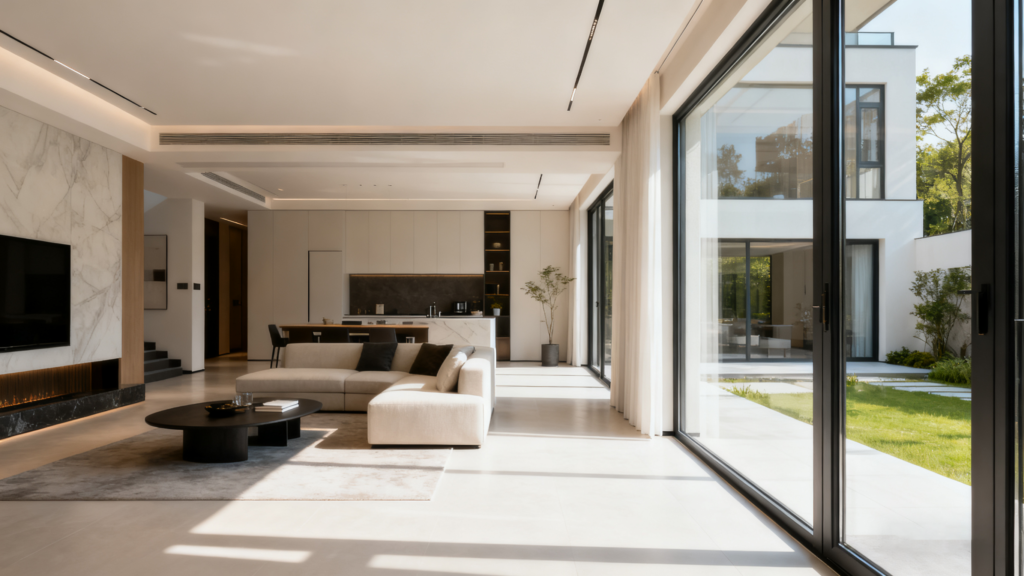In Sydney’s construction sector, energy efficiency is no longer an optional enhancement—it is a mandatory requirement for every residential project. Whether it’s a new build, renovation, or major extension, all projects must comply with BASIX (Building Sustainability Index).
Among all building envelope components, windows and doors have the greatest influence on BASIX energy scoring, especially in terms of heat transfer and overall thermal performance.
For developers, architects, and homeowners, understanding the connection between BASIX and window performance is essential for smooth project approval.
Why BASIX Places Strong Emphasis on Window Performance
Sydney’s climate features hot summers and cool winters. Most energy consumption comes from air-conditioning and heating systems, and windows are often the weakest part of the façade in controlling heat gain and heat loss.
This is why BASIX evaluates key window performance indicators:
• U-value – Measures heat transfer; lower values improve insulation.
• SHGC (Solar Heat Gain Coefficient) – Controls solar radiation entering the home.
• Visible Light Transmittance (VT) – Balances daylighting and heat control.
• Air & Water Tightness – Reduces unwanted airflow and improves HVAC efficiency.
Low-performing windows can lead to:
❌ Higher cooling/heating costs
❌ Poor comfort levels
❌ BASIX score failure
High-performance window systems, on the other hand, significantly improve the BASIX energy score and ensure long-term comfort.
How to Improve BASIX Scores Through Window Selection
The following configurations are the most effective for achieving BASIX compliance in Sydney residential projects:
1. Low-E Double Glazed IGU Systems
Low-emissivity coatings reduce solar heat gain and improve insulation, lowering both U-value and SHGC. This is one of the most impactful ways to increase BASIX energy points.
2. Thermally Broken Aluminum Frames
Multi-chamber structures and PA66 thermal breaks improve the frame’s thermal resistance, making them ideal for high BASIX requirements.
3. Advanced Sealing Systems
EPDM multi-layer seals, hidden drainage systems, and structural silicone sealing improve air and water tightness—factors that influence thermal efficiency.
Each of these components directly contributes to higher BASIX scores.
How M&C Windows & Doors Supports BASIX Compliance in Sydney Projects
As a factory-direct supplier to the Australian market, M&C Windows & Doors has extensive experience helping Sydney developers achieve BASIX compliance with high-performance systems designed for the local climate.
Key advantages include:
Low-E Double Glazed Insulated Glass Units
• Popular configurations such as 5mm+12A+5mm or 5mm+16A+5mm
• Optimized U-value and SHGC for Sydney conditions
• Enhanced acoustic performance for busy urban areas
High-Performance Thermally Broken Window Systems (N5–C4 Rated)
• Multi-chamber thermal break technology
• EPDM sealing and pressure equalization design
• High wind load, excellent water resistance, low leakage
Full AS2047 Certification for Smooth Approvals
M&C holds complete AS2047 test reports for structural performance, air infiltration, water penetration, and safety—documentation commonly required in BASIX submission packages.
These strengths help developers achieve stable, reliable, and compliant results in Sydney energy-efficient builds.
Energy-Efficient Windows: A Core Requirement for Sydney Homes
In Sydney, BASIX compliance starts with high-performance windows. As the largest contributor to heat gain and loss, window quality directly determines whether a project passes energy assessment.
With AS2047-certified systems, Low-E IGU glass, and thermally optimized frames, M&C Windows & Doors provides a proven solution for developers seeking stable performance and long-term energy savings.
High-performance windows are not just a requirement for BASIX—they are the foundation of energy-efficient living in modern Sydney homes.

